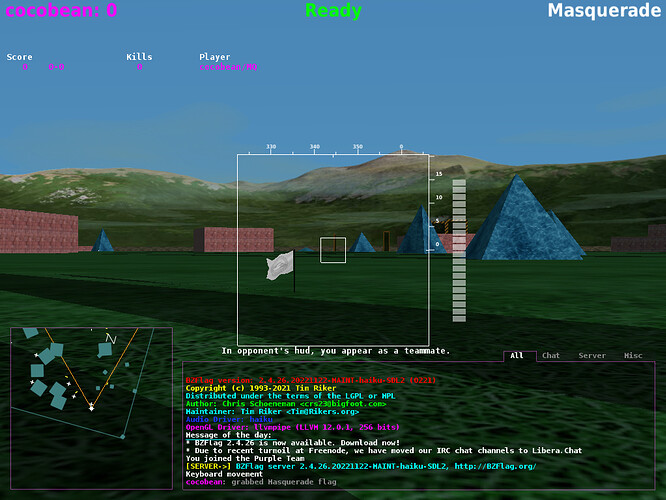

Click Add Target, and create a new C/C++ Library.
#Bzflag server config mac os#
In Xcode on Mac OS X, follow these instructions: When that finishes successfully the plug-in should be ready to use as described above. configure -enable-custom-plugins= Example, AnotherExample, AnotherPlugin Note that you can use a comma-separated list to specify multiple plugins to be built: configure -enable-custom-plugins= Example In the top-level BZFlag source directory run:.

Store the distributed plugin files into the plugins/ Example directory.In the top-level BZFlag source directory run autogen.sh, configure, and make as usual.Copy all of the distributed Example files into the plugins/Example directory.Remove all of the files from the newly created plugins/Example directory (they were created by newplug.sh).In the plugins directory of the BZFlag source tree run the command.Here are the steps to compile a hypothetical third party plug-in named "Example": These plug-ins are located in the /plugins directory.Īs of February 2016, Git tree contains the following plug-ins:Ī number of non-developers have created plug-ins for BZFS, and usually release them on the BZFlag Forums. The BZFlag Source distribution contains a number of plug-ins that are maintained by the project developers. All events and functions that a plug-in can call are in the BZFS API. This programing layer provides the interface to the BZFS application. The config directory is where the BZFlag config.cfg file is located, and the global plug-ins directory is $(prefix)/lib/bzflag/.Īll plug-ins are linked to the BZFS API. This allows the plug-in to perform additional actions on these events, or if need be, alter the results of the default logic of the server.īZFS searches for plug-ins in two standard locations: the config directory and the global plug-ins directory.
#Bzflag server config install#
On load, plug-ins install a number of callbacks and event handlers with the hosting BZFS that are called when specific events happen. Parameters can not have spaces, due to the way BZFS parses command line options and / commands. To pass a parameter to a plug-in, simply add a ',' after the plug-in name or path, and then add the parameter. This is often a numeric value, or a path to a file. Some plug-ins take parameters that are passed to the plug-in on load. While playing, all plug-ins loaded onto the server are visible with the /listplugins command. Using a valid path to the plug-in on load is highly recommended.
#Bzflag server config full#
If the full path to the plug-in is not specified, then BZFS will search a number of known sub directories for the plug-in as it attempts to load it. Plug-ins are loaded at startup by the -loadplugin option, or at run time with the /loadplugin command. On Linux and other Unix-like systems they are built as. On Microsoft Windows they are built as DLL files. Plug-ins are compiled dynamic link libraries, that are built for the same OS/RuntimeEnvironment as the BZFS server that hosts them.


 0 kommentar(er)
0 kommentar(er)
